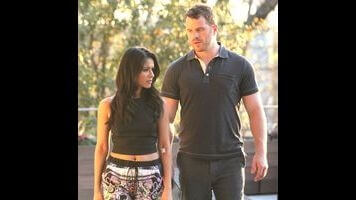Fox’s “resurrected cop” drama Second Chance proves sometimes dead is better

Despite the broader conversation about television’s extended auteurish period, TV’s evolution from “idiot box” to “credible storytelling medium” is still in an embryonic stage. For proof, look no further than broadcast television’s addiction to the high-concept, genre-tinged cop procedural, which seem to pop up far more often than they have any right to in TV’s new golden age. Every example of an out-of-the-box drama can be met with three more examples of broadcast executives saying, “This sounds interesting, but what if these anthropomorphic chandeliers also solved a crime every week?” Fox’s appetite for here’s-the-twist cop drama is unmatched, like the underappreciated Almost Human and soon-to-be overappreciated Lucifer. And yet it’s still surprising the network snapped up the Frankenstein-inspired Second Chance, which strikes the rare balance between being overcomplicated and stupidly simple.
Philip Baker Hall plays Jimmy Pritchard, an aging, disgraced Seattle sheriff who was whisked out of office following a police misconduct scandal he doesn’t deny, but characterizes as the unpleasant ends that justify the law-and-order means. Jimmy spends what were supposed to be his golden years boozing and aspirationally flirting with women a third his age until he inadvertently witnesses a burglary at the home of his FBI agent son Duval (Tim DeKay), who followed in his father’s footsteps up until the good-cop-bad-cop fork in the road.
The goons kill Jimmy to cover up their crime, but he’s resurrected by Otto Goodwin (Adhir Kalyan) and his twin sister Mary (Dilshad Vadsaria), the co-founders of a world-crushing social media platform called Lookinglass. When they aren’t busy running their fictional universe’s equivalent to Facebook, the twins are pioneering technology that allows them to take a dead body and not only reanimate it, but turn back the clock, restoring the corpse to its ass-kicking former glory. Jimmy is the lucky recipient of the first human trial, a move hastened by Mary’s deteriorating health as her cancer grows more aggressive. The break comes with a catch— the revitalized Jimmy (Rob Kazinsky) isn’t the only one getting a new lease on life, and he’s being farmed for cells so he can grant Mary a new lease on hers.
None of this sounds like the makings of a police procedural with a traditional case-of-the-week structure, and yet that’s exactly what Second Chance turns into by only its second episode. It’s revealed that Jimmy’s resurrection came with unintended consequences, as is always the case in this sort of “It’s not nice to fool Mother Nature” morality tale. Conveniently, the consequences bring to bear Jimmy’s crime-fighting skills, which are newly enhanced by the superhuman powers the twins’ technology imbued him with. And if he’s going to be around anyway, why not forge a new relationship with the family that gave him the cold shoulder after he besmirched their name? It’s comically overstuffed, as are most high-concept procedurals, which often mistake narrative clutter for depth. And to its dubious credit, Second Chance definitely isn’t like anything else on television, equal parts cop show, superhero origin story, intergenerational body-swap farce, and a rumination on oversaturated technology and medical ethics.
Of course, that’s a whole lot of parts, and Second Chance never figures out how to bring them into any kind of harmony. That goes both for its bland gumbo of a story and the characters who occupy it, half of whom have no logical reason to interact with the others and vice versa. In the four episodes screened for critics, Second Chance seems like two different shows, one about the goings on at Lookinglass, and another in which Jimmy tries to figure out how to reconnect with his family and determine if his old life is worth reliving. Creator Rand Ravich has a way with these themes, which he demonstrated with NBC’s short-lived Life, about a detective struggling to reclaim his identity after a lengthy prison stay for crimes of which he was later acquitted. There’s a classic tension in Jimmy getting the opportunity to impeach his old bad habits or slip them on like an old glove. Unfortunately there’s so much happening in Second Chance there isn’t much opportunity for that story—or any of the others, for that matter—to take root.
DeKay, who played a similarly straitlaced sidekick on USA’s White Collar, is back in a familiar role he plays well, and he has interesting chemistry with the mischievous Kazinsky. But their bro-ish father-son bond isn’t enough to make Second Chance worthwhile. For all its shiny jewelry, the show is ultimately a plain procedural, and no amount of advanced technology is enough to make it feel brand new.